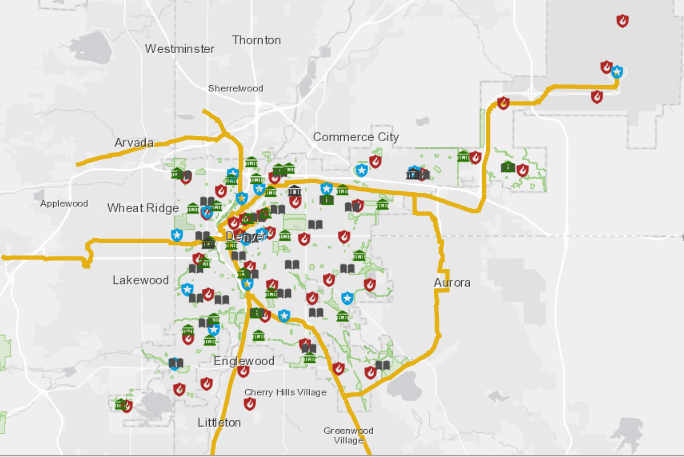Denver's mayor, the director of public safety and the Denver CEO of a major nonprofit gathered Tuesday morning to unveil what is essentially a custom Google map.
The map, also known as "the Community Asset and Resource Mapping Application" or CARMA, marks where social services are located in Denver. It has things like behavioral health centers... but also things like grocery stores. The information is constantly updated so that the map will only include places that are actively accepting new patients or clients in crisis.
The Department of Public Safety created it with the United Way's database. Some police units have been piloting the app since August, using it to immediately guide people in crisis to a health center or other service. They used to use a paper version.
"This tool provides real-time information to help someone connect to resources in the moment," Public Safety Director Troy Riggs said at the press conference. "Many of our public safety staff see firsthand the struggles facing our residents and having this information immediately available can be a game-changer."
CARMA's array of pins and information boxes don't contain anything that isn't already on the internet, but public safety officials say this particular layout will serve as a more user-friendly option for finding nearby services quickly in an emergency. Public safety department officials claim the map is more than just a one-off effort to help Denverites find social services, but rather part of a "philosophical shift" in public safety in the city of Denver.

This change in philosophy was announced last year by new Public Safety Director Troy Riggs, who has committed his department to focusing more on the root causes of crime. The initiative's centerpiece is another simple-seeming map called the Denver Opportunity Index, which layers social metrics like financial security and behavioral health in an area over crime statistics.
Critics of the initiative told Denverite the data is not new or novel (most of it is available to the public in some form on the internet) and several criminal justice advocates told Denverite they have not seen a change on the ground with the way police interact with the community.
Riggs maintains that the way Denver uses data to better understand crime is revolutionary. He says results from the initiative will start to pick up in 2020 when the department plans to roll out a number of partnerships with local nonprofits and community organizations and to open a data center.
While these future initiatives are planned to make up the bulk of the opportunity index, Riggs says the department has already launched a few things that are bearing fruit. One program gave police bags of food to give out to people in need while on patrol. Another data analysis helped the public safety department see the need for a dedicated medical unit within the fire department. The Denver Police Department also created a team this year that patrols with a licensed counselor from the Mental Health Center of Denver.
The unit responds to an area to help residents after a crime is committed or is dispatched to address calls where a mental health professional may be of use.
"More and more we are finding ourselves responding to cases that are not criminal in nature," said Sgt. Carla Havard , the officer in charge of the Citywide Impact Team. "We get out there and we are like a triage nurse."
According to Havard, the CARMA map will help with that triage by allowing her team to immediately guide someone in crisis to a service. The app allows police to hit a button and find open available services within just a few blocks of an ongoing incident.
"We are seeing how policing is changing from just accountability and consequence. There are people suffering," she said. "We need to be part of the solution. We have a responsibility to look at these root causes of crime."













